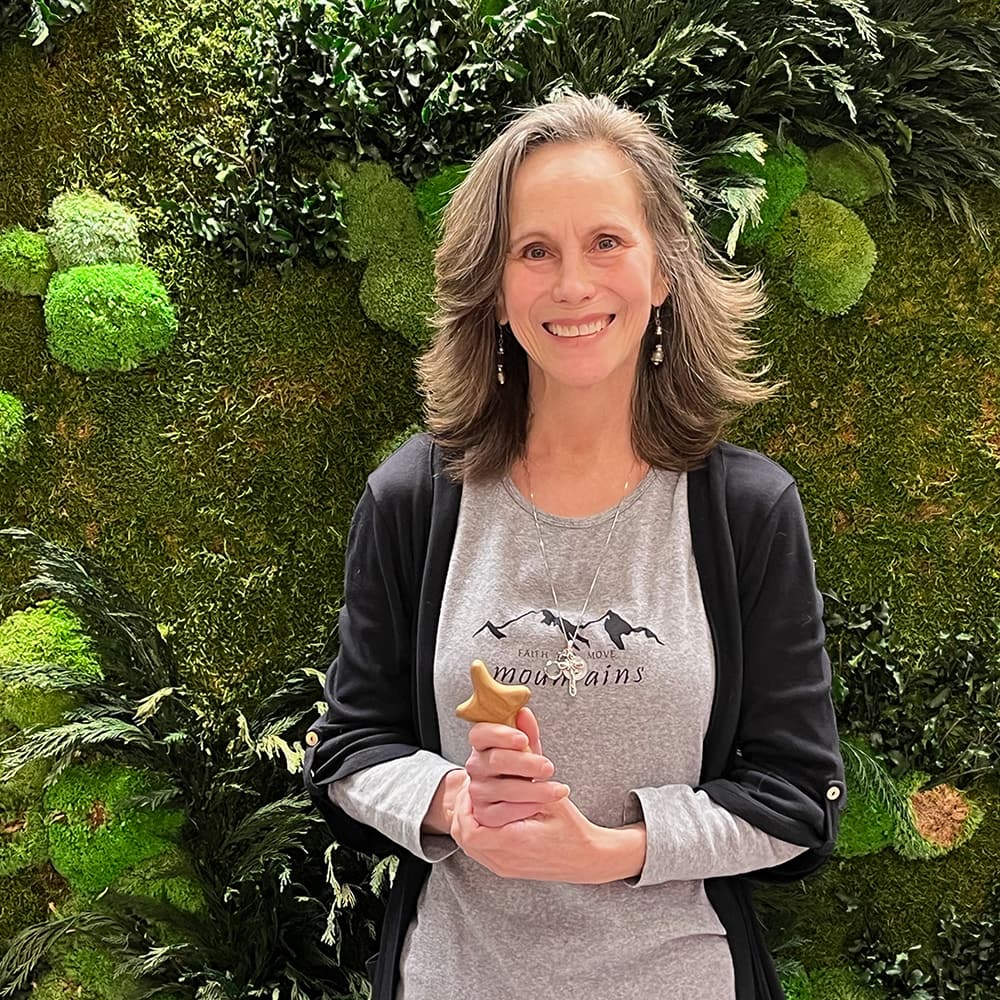
Kris shared her story in March 2024. In February 2025, Kris passed away without the end-of-life option she wanted.
If you agree with Kris that terminally ill Minnesotans should not have to suffer, contact your lawmakers today.
There are three ways to be cured of this disease: be healed with medical intervention (I’ve nearly exhausted all my options), be healed with a miracle from God (which I’m always hoping for) or be healed when I pass away and go to heaven and receive a new body. As much as I hope for a miracle of healing in this life, the reality is I’m dealing with something very deadly and aggressive, so I’m favoring quality of life over quantity. As a Christian, I know heaven is going to be amazing, so when the burden of treatments to keep me alive are no longer worth the suffering, I want to be able to choose how and when I pass away.
For about three months starting in late summer of 2017, I dealt with some intense stomach pain that I assumed was a stress ulcer. I was on a lower-benefit insurance plan at the time and didn’t want to go to the doctor until I could change my insurance. Frankly, I was also tired of going to medical appointments because I’d only recently completed treatments for a traumatic brain injury and other severe injuries I received in a car accident seven years earlier.
I did a detox, but the stomach pain kept coming and going. In October 2017, I went to my primary care doctor and then the ER for a CT scan. That’s when they noticed a mass pressing outside my stomach as well as numerous lesions in my liver.
The disease I have is called malignant gastrointestinal neuroectodermal tumors (GNET), a rare and aggressive soft tissue sarcoma cancer. The longest documented survival time since diagnosis is seven years.
I’ve survived six and a half years. It hasn’t been easy.
In those six and a half years, I have endured two major abdominal surgeries to remove 18 tumors, 65 infusions of both inpatient and outpatient chemotherapy, 10 total sessions of radiation, and five liver ablations to 15 tumors. As a result of these treatments, I’ve had mouth sores, hand and foot syndrome, weakness, weight loss, extreme fatigue, and numerous complications in my abdominal organs and lungs. I’ve lost all my hair three times. I’ve also pursued integrative therapies to help my body recover from the harsh treatments; these have been essential to my survival.
Since I have had so many tumors and treatments to the liver, it is full of scar tissue, which means my liver-targeted therapy options are dwindling. My oncologists at Mayo have warned me that this disease favors the liver, but sometimes sarcomas go to the lungs as well, and I currently have six spots we are watching to determine whether they are tumors or not. If I do have lung tumors, my only option is more chemo, which I dread after all that I’ve already been through. Through all these treatments, my body has been subject to so much drug toxicity that I’m now at risk for cardiac conditions and other complications.
When I was diagnosed, I thought, “I’m going to be the longest survivor of this disease. I’m going to live 20 more years.” But in the last couple of years, I’ve come to the understanding that I probably will die young. My mind still wants to live, but my body is giving out. I just don’t want to suffer anymore, and I suffer any time I receive treatment. I could easily die from complications from treatment rather than the cancer itself.
My passions have stayed the same: being outside, exercising, traveling, trying new places. It’s just harder to do those things now. When you have cancer, it takes over. It takes over your body, and your life revolves around trying to survive and keeping the disease at bay. If I had the option of medical aid in dying here in Minnesota, it would be a way to gain control of my life back. Because then if I hear the words, “You have less than six months to live,” I could be very intentional about my last days. I’d be able to travel, since I’d likely have fewer doctor and treatment visits. I’d go visit friends and family and say goodbye. I’d eat and drink whatever I want without having to follow diet restrictions. I’d try to fulfill the dreams I’ve had, and then I’d hopefully have a peaceful death. It’s a horrible feeling when you don’t have choices. You don’t feel safe, and you dread the future. If I had a more peaceful death as an option, that would make me feel safe, returning some of that control to me.
I met my goal of making it to 50 years old. My next goal is 55. And now a new goal of mine is to see a medical aid-in-dying bill get passed in Minnesota. Having the option of passing away in my sleep, rather than letting cancer have the final word, would give me so much emotional and mental relief. Maybe I would decide not to use the medication to end my suffering. I won’t know until my final days. Regardless, we as terminally ill people should have the autonomy to take the medication or not. It should be totally in our hands to determine when we have endured enough suffering from our diseases and medical interventions.
Mail contributions directly to:
Compassion & Choices Gift Processing Center
PO Box 485
Etna, NH 03750